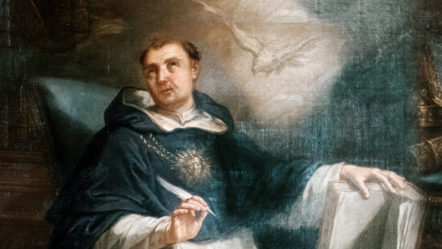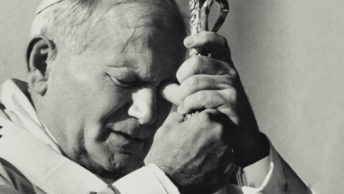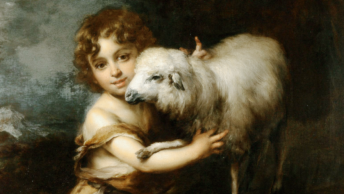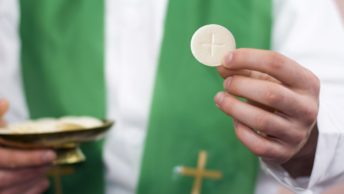As the whole Catholic world is presently celebrating the 700th anniversary of the canonization of St Thomas Aquinas, it is more than appropriate to appreciate some reflections which this great Dominican saint, theologian, philosopher and mystic gives us on the Eucharist. These profound reflections are to be found in the greatest opus of Aquinas, the Summa Theologica.
According to St Thomas the Eucharist is both a sacrament as well as a continuous miracle of Christ’s body and blood which are found in it. In Summa Theologica number 1177 we find: Two things may be considered in the sacrament of the Eucharist. One is the fact that it is a sacrament, and in this respect it is like the other effects of sanctifying grace. The other is that Christ’s body is miraculously contained therein, and thus it is included under God’s omnipotence, like all other miracles which are ascribed to God’s almighty power (Summa Theologica, 1177). Furthermore, the Eucharist works in us the very same work Christ’s Passion worked for us. Aquinas asserts: This sacrament works in man the effect which Christ’s Passion wrought in the world (Summa Theologica, 2480).
Thanks to the Eucharist we are made holy. The highest place belongs to the sacraments whereby man is sanctified: chief of which is the sacrament itself of the Eucharist (Summa Theologica, 2378). Adding to this, the Eucharist is the fulfilment of our spiritual life and the apex of the sacraments taken together. Baptism is the beginning of the spiritual life, and the door of the sacraments; whereas the Eucharist is, as it were, the consummation of the spiritual life, and the end of all the sacraments (Summa Theologica, 2436).
The Eucharist helps us to grow in sacramental grace and this, in turn, makes us progress in our path of holiness. The Doctor Eucharisticus asserts: By this sacrament grace received increases, and the spiritual life is perfected, so that many may stand perfect in himself by union with God (Summa Theologica, 2480). The Eucharist perfects us in the greatest virtue that exists on earth, namely charity. Spiritual food changes man into itself … As Baptism is called the sacrament of Faith, which is the foundation of the spiritual life, so the Eucharist is termed the sacrament of Charity, which is the bond of perfection (Col 3:14) (Summa Theologica, 2436).
The Eucharist makes us aware that grace goes on since Christ is grace itself. Thus, the Eucharist is the explanation of what St Paul writes to the Romans when he boldly states: Where sin increased, grace abounded all the more (Rom 5:20). Aquinas says: This sacrament foreshadows the Divine fruition, which shall come to pass in heaven … And in this respect it is also called the Eucharist, that is, good grace, because the grace of God is everlasting (Rom 6:23); or because it really contains Christ, Who is full of grace (Summa Theologica, 2437).
The Eucharist is the sacrament of the Paschal Lamb, Christ himself. By the blood of the Paschal Lamb the children of Israel were preserved from the destroying Angel, and brought from the Egyptian captivity; and in this respect the Paschal Lamb is the chief figure of this sacrament, because it represents it in every respect (Summa Theologica, 2438). Therefore, Christ’s presence in the Eucharist is recognized by faith. Aquinas explains: The presence of Christ’s true body and blood in this sacrament cannot be detected by sense, nor understanding, but by faith alone, which rests upon Divine authority … Doubt not whether this be true; but take rather the Savior’s words with faith (Summa Theologica, 2446).
The Eucharist is the sacrament which details Christ’s love for us and our salvation. The eminent Dominican emphasizes: This belongs to Christ’s love, out of which our salvation He assumed a true body of our nature. And because it is the special feature of friendship to live together with friends, … He promises us His bodily presence as a reward (Summa Theologica, 2446).
No philosophical formula can explain how the bread and wine are changed into the body and blood of Christ. What we can say is that the change which occurs in both species goes beyond their substantial nature, so much so that it is called transubstantiation. Aquinas intelligently and humbly teaches us: This is done by Divine power in this sacrament; for the whole substance of the bread is changed into the whole substance of Christ’s body, and the whole substance of the wine into the whole substance of Christ’s blood. Hence this is not a formal, but a substantial conversion…. It can be called transubstantiation (Summa Theologica, 2450).
The Eucharist forgives sins. St Thomas reminds us: The sacrament has from Christ’s Passion the power of forgiving all sins, since the Passion is the found and cause of the forgiveness of sins (Summa Theologica, 2482). Aquinas also speaks of the Eucharist’s task of preserving us in sanctifying grace through union with Christ and serves as repellent to the devils’ assaults on us. He says: This sacrament preserves man from sin in both of these ways. For, first of all, by uniting man with Christ, through grace, it strengthens his spiritual life, as spiritual food and spiritual medicine …. Secondly, inasmuch as it is a sign of Christ’s Passion, whereby the devils are conquered, it repels all the assaults of demons (Summa Theologica, 2484).
Lastly, the Eucharist is our spiritual nourishment indeed. St Thomas helps us understand this important point when he says: This sacrament is spiritual food; hence just as bodily food it is taken every day, so is it a good thing to receive this sacrament every day. Hence it is that our Lord (Lk 11:3), teaches us to pray, Give us this day our daily bread (Summa Theologica, 2498).
May our assiduous spiritual study of the Summa Theologiae brings us to the extent that we too love Jesus’ Eucharistic presence in the sacrament as well as his mystical presence in our neighbour. Let us resort to the powerful intercession of the Angelic Doctor, St Thomas Aquinas, to be and live fully in God and for God.








